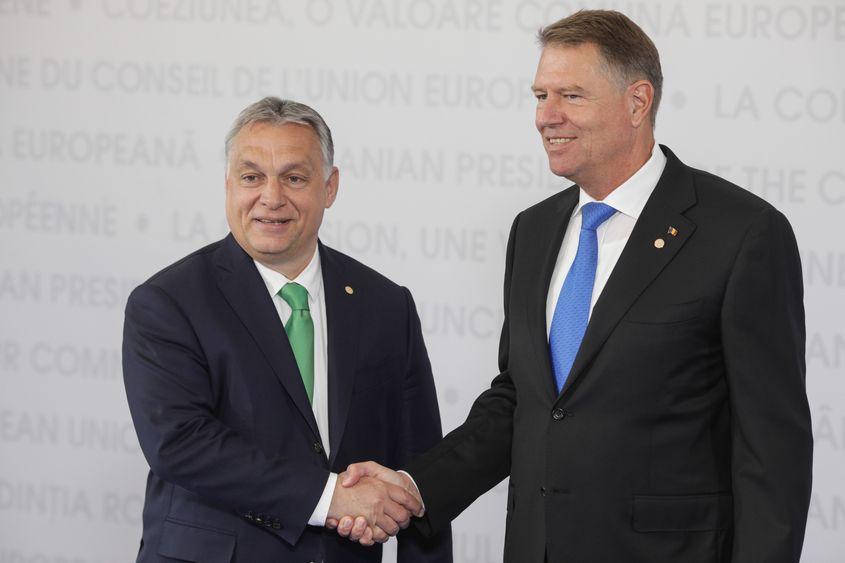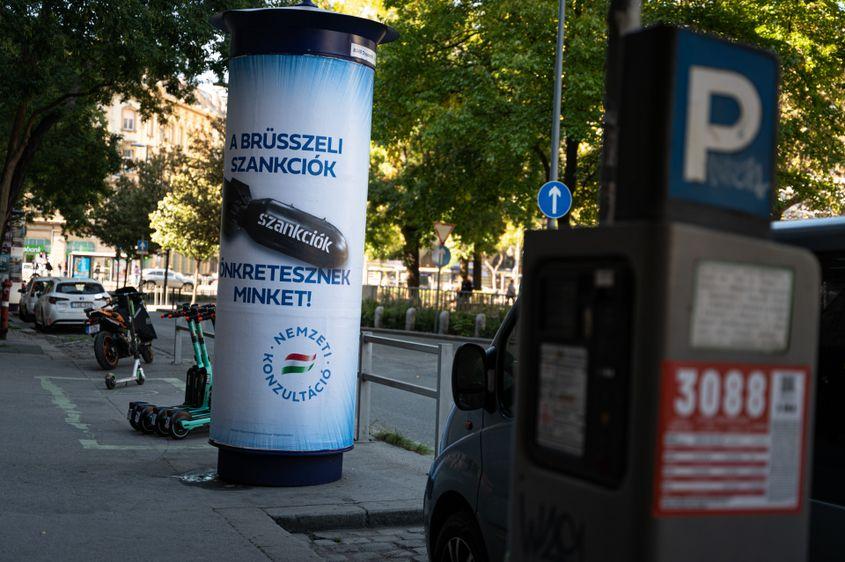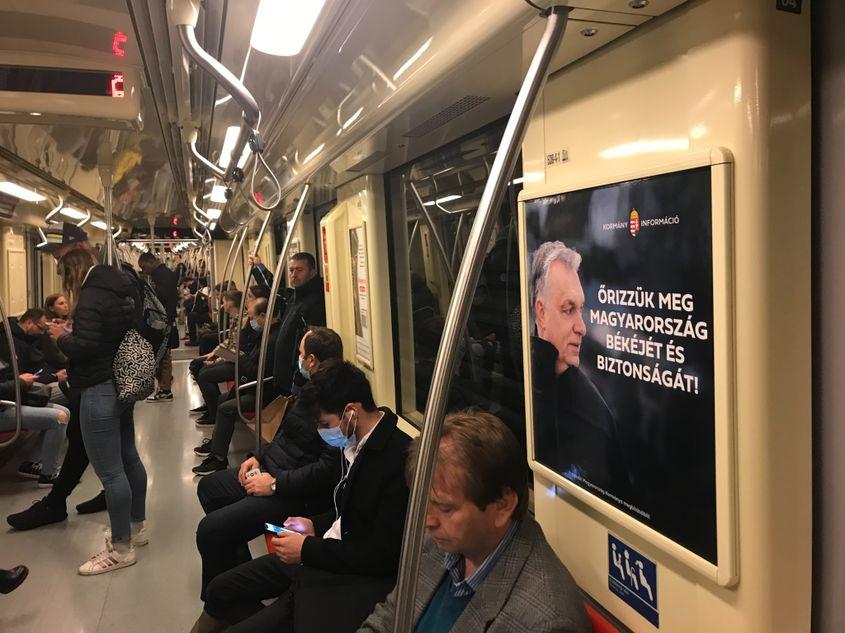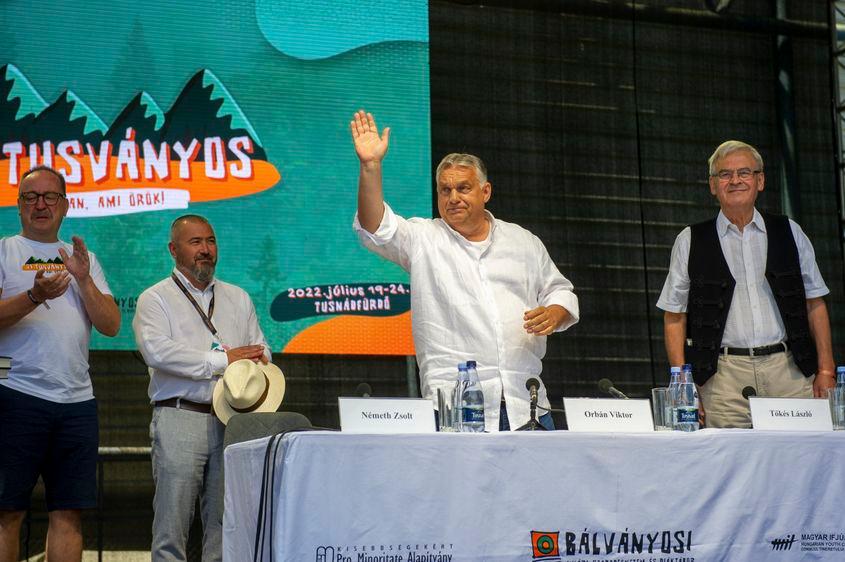Hungarian Prime Minister Viktor Orban is welcomed by Klaus Iohannis in Sibiu where the Informal Summit of European leaders is taking place, Thursday, May 9, 2019. Inquam Photos/Octav Ganea
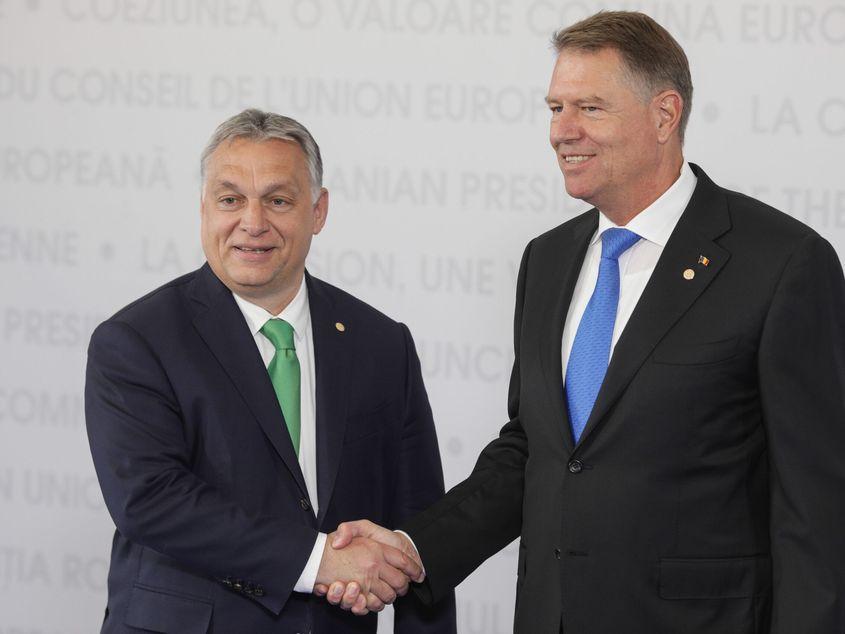
Hungarian Prime Minister Viktor Orban is welcomed by Klaus Iohannis in Sibiu where the Informal Summit of European leaders is taking place, Thursday, May 9, 2019. Inquam Photos/Octav Ganea
31/10/2022
Hungary: How the Orban regime is manipulating public opinion through feigned ”national consultations”
- These days, Hungary is in the middle of a "national consultation" regarding the anti-Russia sanctions imposed by the European Union.
- Although it looks like an interesting exercise of direct democracy, through which the government asks and the people answer, these consultations have no legal value.
- Since 2010, when he came to power, Viktor Orban has been using this tool to impose his vision on the world on the front page of the public agenda.
- A different tool he uses to promote his stories - usually fake - is the media. Currently, a large part of the Hungarian media landscape has been captured by Orban and his henchmen.
We want to keep fighting against disinformation and fake news. If it's also important for you, join us in our efforts! Any donation is of vital importance for us.PressOne
I am travelling to Budapest in a van driven by a lady with dual citizenship who, for about 15 years, has taken root in the Hungarian land and who earns her living making regular trips between Oradea/Cluj-Napoca and the Hungarian capital. When we cross the border, the radio automatically switches to a Hungarian station. I do not speak the language, so I cannot claim to understand much of what is being said. But I can understand that we are listening to the news. I catch two words, "illegális migráció” - illegal migration, an old obsession of Hungary's governing party since 2010. A first sign that we have arrived in Orban's Hungary.
Hungarian Prime Minister Viktor Orban is welcomed by Klaus Iohannis in Sibiu at the Informal Summit of European leaders, Thursday, May 9, 2019. Inquam Photos/Octav Ganea
I am travelling to Budapest in a van driven by a lady with dual citizenship who, for about 15 years, has taken root in the Hungarian land and who earns her living making regular trips between Oradea/Cluj-Napoca and the Hungarian capital. When we cross the border, the radio automatically switches to a Hungarian station. I do not speak the language, so I cannot claim to understand much of what is being said. But I can understand that we are listening to the news. I catch two words, "illegális migráció” - illegal migration, an old obsession of Hungary's governing party since 2010. A first sign that we have arrived in Orban's Hungary.
Once I arrive in Budapest, I exchange two or three words with the lady driver. I ask her if she likes Budapest. She does. She lives in Buda, the historical capital of the Kingdom of Hungary, an area that today hosts Buda Castle and the residence of the Hungarian president. She likes it there because it is a "more residential area", without the hustle and bustle on the other side of the Danube, in Pest, where you meet many tourists "and all kinds of other people", she says with a hint. Besides the fact that it is very touristy, Pest is also the most cosmopolitan/multicultural area of the city. The second sign that I am in the right place.
One day later, I start my morning viewing political content on YouTube. Suddenly, the debate I'm following is interrupted by a sensationalist promo commissioned by the Hungarian government - I see images of the European Parliament, huge gas pipelines, war scenes reminiscent of the conflict in Ukraine and a nuclear bomb. I hear words such as "infláció" (inflation), "konzultáció" (consultation), "szankciók" (sanctions) or "Brüsszel" (Brussels).
I have barely arrived in Hungary and I already feel that the Universe is trying to remind me of the purpose of my visit at every step. I am here to see what it is like to do independent journalism in a country where much of the media has been captured by the government or friends of the government. And where, if you want to see the latest fake narratives about refugees and the war in Ukraine, you do not have to go to Facebook or Telegram, it is enough to turn on the TV when the prime minister or another member of the cabinet is holding a press conference.
Mulți ne citesc, puțini ne susțin. Fără ajutorul tău, nu putem continua să scriem astfel de articole. Cu doar 5 euro pe lună ne poți ajuta mai mult decât crezi și poți face diferența chiar acum!
Fidesz mimics democracy to play the games of Russian propaganda
A few hours later, Blanka Zöldi, coordinator of the anti-disinformation platform Litmus - the platform affiliated with the independent publication 444.hu, one of the largest in Hungary - gives me a little context for the things I see on YouTube.
This fall, Hungary is organizing what the Budapest government calls "national consultation". It is not the first approach of this kind. It is a populist tool that Viktor Orban uses every time he wants to impose a specific topic on the public agenda.
Budapest has been plastered with posters promoting the national consultation on anti-Russia sanctions. Photo source: 444.hu
Five years ago, the Hungarian prime minister organized a similar consultation, targeting George Soros, the billionaire of Hungarian origin. Budapest accuses the billionaire of wanting to fill the country with refugees, and the role of the consultation was to find out if the Hungarian people agree or not with such a thing. This fall's consultation concerns the sanctions imposed by the European Union on Russia.
Predator in Robes: The Diocese of Iași and the Vatican Buried a Sexual Assault Committed by a Catholic Priest Against a Minor in Bacău, Failing to Alert Prosecutors
A Roman Catholic priest abused a 13-year-old girl in the parish where he served in Bacău County: the bishop of Iași knew about it, sent the case to the Vatican, and applied canonical sanctions, but did not notify the authorities, who only intervened later and sentenced him to prison.
Orban's goal is simple: to sell the Hungarian people the idea that the sanctions are useless, and at the end of the day all the citizens of the Union are affected, through higher energy bills, expensive gasoline, and galloping inflation.
"Orban says that these sanctions were imposed in an undemocratic manner, because the European citizens were not consulted before, but he omits to say that the process involved Hungary directly. He and the foreign minister voted for all these sanctions", Blanka says.
Practically, although he voted for sanctions, the current discourse of power is that there must be peace at any price, says András Király, foreign policy reporter at 444.hu.
Un newsletter pentru cititori curioși și inteligenți.
Sunt curios
"Recently, Orban said that if we give weapons to Ukraine, we prolong the war. And that Europe and the United States should make an agreement with the Russians without involving the Ukrainians", the foreign policy specialist of 444.hu explains.
| When he was in the opposition, Orban was a fierce critic of Russia and its energy dependence, and in 2008 he strongly condemned the invasion of Georgia. A first explanation for the change in attitude would be that the Hungarian industry has been dependent on Russian oil and gas since the communist era. The nuclear power plants in Hungary were built and are being built in partnership with Russia. Energy dependence is almost total. In theory, Hungary could obtain gas and oil from other places as well, but they would not be as cheap. A second possible explanation, extensively explored by Balkan Insight in an analysis published at the beginning of the year, is that Orban and his relatives would have to gain financially from being close to Russia (but also to China). Then, András believes that Orban came to see in Putin a true model of leadership. "He is a strongman, they both fight with the independent media and civil society, we had similar laws regarding civil society, such as the law which stipulated that foreign-funded organizations must register as foreign agents”, the journalist explains. |
Returning to the national consultation on sanctions, the process should proceed as follows: the Hungarian state sends each citizen a leaflet including several questions by post, citizens answer them, then send the leaflet back to the state, and the state only has to aggregate the results. Alternatively, citizens can fill in the form online, using a government platform. On paper, it looks like an interesting experiment in direct democracy. In reality, however, it is only political theater and the approach has nothing to do with the democratic process, Blanka claims.
"For example, when it came to refugees, a question sounded something like this: 'Certain people say that the demographic crisis in Europe should be solved by supporting the traditional family, including by financial support from the government. Others say that we should let one million immigrants come here. Who do you agree with?", the Hungarian journalist remembers.
The national consultation on sanctions is promoted by a poster with a nuclear bomb that says "sanctions". Photo source: 444.hu
When it comes to the sanctions imposed by Brussels on Russia, a manipulative question can sound something like this:
"It is very likely that food prices will increase because of the sanctions. Do you think these sanctions are good?"
In addition, national consultations have no legal value and nothing to do with the Hungarian political system - they are neither referendums nor representative public polls. And, although it has no legal or sociological value, a national consultation can cost up to tens of millions of euros. Public money spent strictly in the interest of Fidesz, who thus manages to impose its false narratives on the front page of the political agenda.
In addition, it is very easy for these results to be flawed, says Blanka. As a rule, only the most loyal fans of Fidesz bother to send the answers back to the government. Thus, it is very likely that the final results leave the impression that "90% of Hungarians believe that the sanctions do more harm than good and should be lifted", although only about 200 thousand people out of a population of almost ten million bothered to actually participate in the consultation.
Then, when it comes to the online form, it can be filled in as many times as you want, András Király explains.
"You can complete it from the same IP, no one checks it. Orban can fill it in millions of times and then say that everyone wants this", András continues.
A captured media where misinformation has become mainstream
For two years now, in Romania we have gotten used to false narratives - about pandemics, vaccines, war, cockroaches - first appearing on the periphery of politics and then penetrating, in one form or another, into the mainstream. In Hungary, the most prolific source of false narratives is the ruling party itself. The national consultation is just one of the tools used by the government to propagate these false narratives in the public space. The most important weapon remains, however, the media.
"It is very important to understand that when we talk about how false narratives spread in Hungary, it often does not happen in the fringe areas of Facebook, with chemtrails and other things like that. In fact, political discourse itself is oriented around false narratives. It is mainstream. It is also related to the structure of the media industry in Hungary. In the past 12 years, Fidesz has gradually captured significant parts of the independent media industry in the country", Blanka Zöldi says.
Currently, Fidesz or businessmen close to the party control over 50% of the relevant media. Capturing the media was a long-term project for Orban and Fidesz. First, they turned all the state media into a mouthpiece of the party. Then they put a lock on the largest left-wing newspaper in the country and, through businessmen close to Fidesz, captured the largest news sites in Hungary, Origo and Index, taking advantage of their dependence on advertising revenue.
Budapest 2022 election poster for Viktor Orban's Fidesz party: "Let's keep Hungary safe." Photo: Mălina Gîndu
The takeover process culminated in the centralization of all publications loyal to the government within Central European Press and Media Foundation, a holding that today counts approximately 500 media institutions, according to a Balkan Insight analysis. If in 2010 Hungary ranked 40th in a ranking of press freedom prepared by Freedom House, in 2017, after only seven years of Fidesz government, Hungary ranked 87th in the same ranking.
Recently, the government started to get involved a lot in social media, says Blanka. They work with conservative influencers on Facebook, whom the government finances directly. For this purpose, a training foundation for future social media propagandists, "Megafon Center", was established. How the funds get from the state to the foundation and then to the influencers remains a mystery, but a Hungarian court recently showed that it is justified to say that the center takes money from the state, even if their route is not very transparent.
Blanka says that the propaganda machine is very well organized. When the leaders of the political scene say something false, their messages inevitably reach the enslaved press and social media. Sometimes, the lie does not even need to be very blatant for it to take over the public space at a later time. It is enough for Orban and other Fidesz politicians to mention a specific topic of discussion. The war in Ukraine, for example.
"Then, pro-government experts and pro-Orban media actors will go on TV and say 'who knows what happened in Bucea?'. They do not need to flatly deny the massacre or say that Russia is innocent, but it is enough to raise suspicions, to muddy the waters. Something that has a very strong impact, because then you can see what people comment and think on social media", the Hungarian journalist continues.
Vaccination and COVID - when the lack of transparency is stronger than any false narrative
In other cases, however, the government did not play the international disinformation game. At least not on the same coordinates used by other populist parties in Europe. During the pandemic, when his old admirers from Romania organized anti-restrictions and anti-vaccination protests in Piata Victoriei, under the pretext that we have turned into a medical dictatorship, Orban was leading the country by decree and intensively promoted the importance of anti-COVID immunization.
Blanka describes it as a period when false narratives about vaccines (very popular among his friends in Europe) were replaced in Hungary with a total lack of transparency. Technically speaking, the Hungarian government promoted vaccination. Technically speaking, the Hungarian government vaccinated more than 65% of the population, unlike Romania, which vaccinated only about 40 percent of its population.
In practice, however, the relevant information about what happens in hospitals and about vaccines was almost completely absent from the public space, and the immunization campaign was used by the government and the enslaved press as a rhetorical tool, to build Orban an image of an effective and pragmatic leader, who negotiates with all the vaccine producers around the world, including those from the East.
Every year, Viktor Orbán, Prime Minister of Hungary, also visits Romania. Băile Tușnad, Harghita, Saturday, 23 July 2022. Inquam Photos / Laszlo Beliczay
Thus, Blanka says that it is difficult to get a clear idea about the success of the vaccination campaign, because Hungary also used serums that were not approved in the rest of the European Union - Sputnik (Russian) and Sinopharm (Chinese). Although their effectiveness is disputed, especially when it comes to preventing serious illnesses in elderly patients, they were used in relatively large numbers - at one point, over a million of Hungary's seniors had been immunized with Sinopharm.
"There was no information about the adverse effects and effectiveness of these vaccines from the East. Although it was later proven that the Chinese vaccine was less effective, the government insisted on measuring the success of the vaccination campaign by the percentage of people vaccinated in the total population. Before, there was a lot of talk about how we have a good death rate. But after the death rate started to increase, they stopped talking about the dead, they only talked about how many people they managed to vaccinate", Blanka explains.
Independent publications such as 444.hu do not have much room to maneuver when faced with such a lack of transparency. If you are a journalist who is not friends with Fidesz and you make a request for information of public interest, you will hit a wall. The institution you have requested information from will either ignore you, or provide an expedite reply after two or three months. Of course, there is an option to sue the state. A trial will last up to two years though, and before you get a reply, the topic has been long gone from the public agenda.
When I leave Budapest, Orban's consultation is in full swing. Participants can send their answers until December 9. It is difficult to say what its effects will be if it will later be translated into actual public policies.
"As a rule, it's just a political communication mechanism. For example, Viktor Orban could say that the majority of Hungarians do not support the sanctions, so from now on he will take a stronger stance against the European Union, because he represents the opinion of the Hungarians. The consultations have no legal effects, neither in the Hungarian Parliament, nor in the EU", Blanka Zöldi answers, when I ask her about what could happen from December 9 onwards.

Avem nevoie de ajutorul tău!
Mulți ne citesc, puțini ne susțin. Asta e realitatea. Dar jurnalismul independent și de serviciu public nu se face cu aer, nici cu încurajări, și mai ales nici cu bani de la partide, politicieni sau industriile care creează dependență. Se face, în primul rând, cu bani de la cititori, adică de cei care sunt informați corect, cu mari eforturi, de puținii jurnaliști corecți care au mai rămas în România.
De aceea, este vital pentru noi să fim susținuți de cititorii noștri.
Dacă ne susții cu o sumă mică pe lună sau prin redirecționarea a 3.5% din impozitul tău pe venit, noi vom putea să-ți oferim în continuare jurnalism independent, onest, care merge în profunzime, să ne continuăm lupta contra corupției, plagiatelor, dezinformării, poluării, să facem reportaje imersive despre România reală și să scriem despre oamenii care o transformă în bine. Să dăm zgomotul la o parte și să-ți arătăm ce merită cu adevărat știut din ce se întâmplă în jur.
Ne poți ajuta chiar acum. Orice sumă contează, dar faptul că devii și rămâi abonat PressOne face toată diferența. Poți folosi direct caseta de mai jos sau accesa pagina Susține pentru alte modalități în care ne poți sprijini.
Vrei să ne ajuți? Orice sumă contează.
Share this


